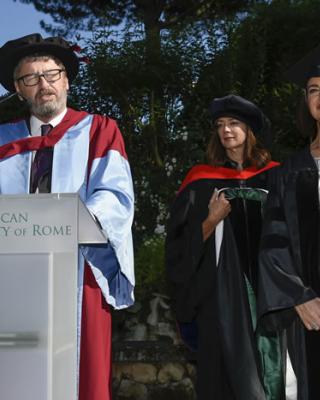Q. What basic skills are essential for a student entering this program?
A. Appreciation of cultural diversity, good communication skills, critical thinking skills, a basic understanding of world (and, specifically, European/Mediterranean) history
Q. What characteristics would an ideal student have/display?
A. An ideal student would be a highly motivated individual, capable of articulating a critical stance toward his/her own ethnic/cultural/political context with an interest in religion, politics and world affairs. If they have a strong background in Humanities/International Relations, so much the better.
Q. What distinguishes AUR's MA in Peace Studies from those of other institutions?
A. Our MA has a strong cocentration on the religious component as a factor of both peace and war. Our MA program enables students to recognize, analyze and explain economic and political factors behind wars/conflicts in conjunction with religious elements.
Students who are likely to do well on the AUR MA Peace Studies are those interested in religion as a factor in political/military conflicts, as well as in conflict resolution, peace building, and humanitarian intervention.
Q. What are the key marketable skills that graduating students will leave with?
A.
- Conflict resolution and negotiation skills
- Understanding of the peace building process
- Religious and cultural sensitivity skills
- Ability to identify major sources of conflicts, as well as ideological and institutional factors contributing to wars and their resolution
- Ability to critically analyze religious teachings and practices, especially those that are directly relevant for the socio-political issues.
- Graduate-level research skills
- Ability to use and critically analyze various types of sources, ranging from non-literary sources, to eye-witness reports, policy papers and media reports.
- Ability to communicate ideas and arguments effectively, in speech or in writing, in an accurate, focused and lucid manner
Q. What benefit do students gain from undertaking an Internship during their MA studies?
A. Internships bring a range of real benefits, as well as serving to give opportunity to put theoretical knowledge into practice:
- Students begin to develop their own network of contacts in the areas/organizations relevant for their future careers
- Students gain understanding of how particular institutions or programs work (in the domain of their specific interest), e.g. national, regional and international NGOs, governmental organizations, religious institutions, etc.
- Students are able to familiarise themselves with the current issues, practices, and procedures in their specific area of their interest.

